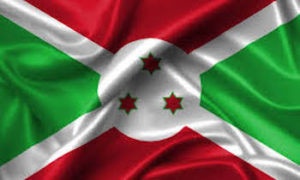
Burundi Flag
*This date in 1962 celebrates Burundi's independence from Belgium.
Burundi is a landlocked country in the Great Rift Valley where the African Great Lakes region and East Africa converge. It borders Rwanda to the north, Tanzania to the east and southeast, and the Democratic Republic of the Congo to the west; Lake Tanganyika lies along its southwestern border. The capital cities are Gitega and Bujumbura.
Burundi began its drive for independence on January 20, 1959. At that time, Burundi's ruler, Mwami Mwambutsa IV, requested Burundi's independence from Belgium and the dissolution of the Ruanda-Urundi union. In the following months, Burundian political parties began to advocate for the end of Belgian colonial rule and the separation of Rwanda and Burundi. The first and largest of these political parties was the Union for National Progress (UPRONA). The Twa, Hutu, and Tutsi peoples have lived in Burundi for at least 500 years. For more than 200 years, Burundi was an independent kingdom until the Berlin Conference, when Germany colonized it.
After the First World War and Germany's defeat, it ceded the territory to Belgium. Germans and Belgians ruled Burundi and Rwanda as a European colony, Ruanda-Urundi. Burundi and Rwanda had never been under a common rule until European colonization. Technically, Burundi gained independence in 1962 and initially had a monarchy. Still, a series of assassinations, coups, and a general climate of regional instability culminated in establishing a republic and a one-party state in 1966. Stretches of ethnic cleansing and two civil wars and genocides during the 1970s and again in the 1990s left the economy undeveloped and the population one of the world's poorest. On March 13, 1992, Tutsi coup leader Pierre Buyoya established a constitution that provided for a multi-party political process and reflected multi-party competition.
The presidents of Rwanda and Burundi, both Hutus, died together when their airplane was shot down in April 1994. The Rwanda Murders followed. Four years later, on June 6, 1998, the constitution was amended, expanding the National Assembly's seats and providing for two vice presidents. Following the Arusha Accord, Burundi established a transitional government in 2000. In October 2016, Burundi informed the UN of its intention to withdraw from the International Criminal Court. Burundi remains primarily a rural society, with only 13.4% of the population living in urban areas as of 2019. The population density of approximately 315 people per square kilometer (753 per square mile) is the second-highest in Sub-Saharan Africa. Roughly 85% of the population is of Hutu ethnic origin, 15% is Tutsi, and fewer than 1% is indigenous Twa. The official languages of Burundi are Kirundi and French, Kirundi being recognized officially as the sole national language.
One of the smallest countries in Africa, Burundi's land is primarily used for subsistence agriculture and grazing, resulting in deforestation, soil erosion, and habitat loss. As of 2005, the country was almost completely deforested, with less than 6% of its land covered by trees and over half of that being commercial plantations. In addition to poverty, Burundians often have to deal with corruption, weak infrastructure, poor access to health and education services, and hunger. Burundi is densely populated, and many young people emigrate in search of opportunities elsewhere. 2015 witnessed large-scale political strife as President Pierre Nkurunziza opted to run for a third term in office, a coup attempt failed, and members of the international community broadly criticized their parliamentary and presidential elections.
The sovereign state of Burundi's political system is based upon a multi-party system. The President of Burundi serves as both the head of state and the head of government. There are currently 21 registered parties in Burundi. The World Happiness Report 2018 ranked Burundi as the world's least happy nation with a rank of 156. Burundi is a member of the African Union, the Common Market for Eastern and Southern Africa, the United Nations, and the Non-Aligned Movement.